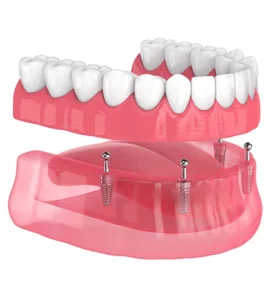Request Appointment
Kissimmee

New Patients Only: (407) 635-1196

All Other Callers: (407) 932-2273
Saturday By Appointment
Schedule Now

Call Us
Call Us Now

All-on-4 dental implants have become one of the most advanced and reliable solutions for patients suffering from significant tooth loss. This procedure offers a permanent, natural-looking restoration using just four strategically placed implants to support a full arch of teeth. However, understanding All-on-4 Dental Implants cost is essential before making an informed decision about treatment.
All-on-4 dental implant costs in the U.S. range from $12,000–$28,000 per arch, or $24,000–$56,000 for a full mouth. Prices usually include the full procedure, though additional costs may apply depending on individual needs.

All-on-4 dental implants refer to a technique where a full arch of teeth is supported by just four dental implants. This method is often preferred because it requires fewer implants and offers immediate results, sometimes with a temporary set of teeth placed on the same day.
The All-on-4 Dental Implants Cost varies significantly depending on the region, materials used, and the specific needs of the patient. On average, the price for All-on-4 dental implants in the United States ranges from:
These figures typically cover the entire procedure, including consultations, imaging, implant placement, and both temporary and permanent teeth. However, additional costs may apply based on your unique situation, influencing the All-on-4 Dental Implants Cost.
While the All-on-4 treatment is often more affordable than other full-arch implant solutions, the four implants still offer excellent durability and function. The All-on-4 Dental Implants procedure is ideal for patients with sufficient bone volume and those who want to restore their smile without the need for additional implants.
Several factors can influence the final all-on-4 dental implants cost:
Choosing materials that offer both durability and aesthetic value can affect both the upfront all-on-4 dental Implants cost and the long-term benefits of your implants.
In some cases, additional procedures may be necessary before the all-on-4 dental implants can be placed. These might include:
The All-on-4 dental implants cost can vary depending on the experience of the dental professional performing the procedure. A highly experienced implant specialist in a metropolitan area like Kissimmee, FL, may charge higher fees, reflecting their expertise and the higher cost of running a dental practice in a busy location.
The All-on-4 technique generally involves four implants per arch, but if additional implants are necessary for a full mouth restoration, the cost will increase. Some patients may require All-on-6 (six implants) or All-on-8 (eight implants), which will significantly raise the price.
Post-surgical care is an important factor that can influence the overall all-on-4 dental implants cost. While initial consultations, surgeries, and prosthetics may be covered in the upfront price, follow-up visits, adjustments, and potential repairs or replacements of temporary prosthetics can increase the overall cost.
Sedation options, such as oral sedation, IV sedation, or general anesthesia, can add an additional cost to the procedure. The type of sedation used, and the duration of the procedure, will determine the additional expense.
While most dental insurance plans do not cover the full cost of all-on-4 dental implants, they may cover certain aspects of the procedure, such as diagnostic imaging or extractions. The extent of your insurance coverage will impact your out-of-pocket expenses.
Dental insurance typically covers a portion of the cost of All-on-4 implants, but most plans only cover basic procedures such as tooth extractions or dentures. For all-on-4 dental implants, insurance coverage is usually limited to 10-50% of the cost. At Parkway Dental Care, we strive to help you maximize your insurance benefits and minimize your out-of-pocket expenses.
In addition, we offer in-house financing options, allowing you to pay for the procedure in manageable monthly installments, reducing the overall burden of all-on-4 dental implants cost.
All-on-4 dental implants present an innovative, cost-effective, and reliable solution for full-arch tooth replacement. Understanding the all-on-4 dental implants cost, including the factors that influence pricing, can help you make an informed decision about your treatment.
If you’re ready to restore your smile, Call (407) 932-2273 or schedule a consultation with Parkway Dental Care in Kissimmee FL today. Our team will help you understand the all-on-4 dental implants cost and guide you through the procedure.
When properly cared for, All-on-4 dental implants can last 20 years or more. The prosthetic teeth may need to be replaced or adjusted over time, but the implants themselves are designed to be a long-lasting solution.
The All-on-4 dental implants procedure is performed under local anesthesia or sedation, so patients typically do not experience pain during the surgery. After the procedure, some discomfort, swelling, and bruising may occur, but these symptoms usually subside within a few days.
Most patients can return to light activities within 24 to 48 hours after the All-on-4 procedure, but strenuous activities should be avoided for at least a week.
After the All-on-4 dental implants procedure, you may need to follow a soft food diet for the first few weeks, especially if you have temporary teeth in place. Once your permanent prosthetics are placed and your implants have fully integrated with the bone, you can eat normally.
The main difference between All-on-4 dental implants and traditional implants is the number of implants required. With traditional implants, each missing tooth requires its own implant, leading to more implants and a higher overall cost. In contrast, All-on-4 uses four implants to support an entire arch of teeth, making the procedure less invasive, quicker, and more cost-effective.
Yes, All-on-4 dental implants are ideal for patients with bone loss. The technique is designed to make the most of available bone, and it often eliminates the need for bone grafting. The implants are strategically placed to anchor securely into the jaw, even if bone density is reduced.